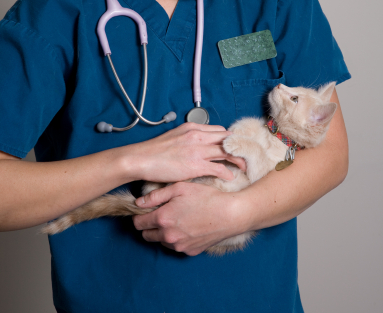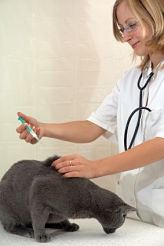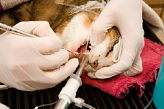Feline Immunodeficiency Virus (FIV)

A Cat Fanciers Association (CFA) website page stated that Feline Immunodeficiency Virus (FIV), was first discovered in 1986 in a cattery in California, where some cats appeared to have an illness similar to AIDS. Since that time, FIV has been discovered in every country that has tested for its presence.
But Feline Immunodeficiency Virus didn't simply spring into existence in the mid-1980's. That's just when it was first identified. At the Cornell Feline Center, stored feline serum that dates back to 1958 has been tested and found to be positive for FIV. It turns out Feline Immunodeficiency Virus was one of the unidentified illnesses that veterinarians admitted they didn't understand or know what was causing the problems back then. Now it is identifiable.
FIV is not a disease but a virus that results in immunosuppression ...suppression of a cat's immune system response. Immunosuppression weakens the body's defenses and leaves a cat vulnerable to infection. Because FIV leads to immunosuppression, an FIV infected cat is predisposed to a wide array of debilitating infections.
Feline Immunodeficiency Virus is a retrovirus, in the same family as HIV. This is a family of viruses with an enzyme called "reverse transcriptase", which allows the virus to insert itself into cellular DNA. There are several sub-varieties of retrovirus, as well; for example, both FIV and HIV are lentiviruses ("lenti" meaning slow). Lentiviruses are known for being species specific...HIV is human and FIV is feline and they cannot be transferred to the opposite species. Progression is slow but resulting in life-long infection.
There are basically three stages of feline immunodeficiency virus. The first stage occurs a few weeks after infection and may go unnoticed. Early signs of FIV are mild and transient. The cat may run a transient fever, might not eat for a few days and just may feel blah. They are mild flu-like symptoms. There is a decreased white blood cell count (leukopenia), and enlarged lymph nodes (lymphadenopathy) lasting several weeks to months.
During the second asymptomatic (latent) stage the cat remains healthy for up to several years. The third stage of feline immunodeficiency virus is characterized by a range of clinical disorders and infections. Eventually, the cat's immune system is so weakened it can no longer protect the cat and the cat succumbs. However, there is some hope because FIV has a relatively long incubation period so a recently diagnosed asymptomatic cat may have many disease free years ahead of it because it may remain dormant.
The chronic stage is when a number of persistent and recurring clinical disorders and infections occur that are typical of the third and chronic stage of FIV. The most common are disorders of the oral cavity...gingivitis (inflammation of the gums), stomatitis (inflammation of the lining of the mouth), and periodontitis (inflammation of the tissue around the teeth leading to tooth loss). FIV infected cats also frequently suffer from persistent infections of the respiratory tract.
Other problems include infections of the skin and ear canal, persistent diarrhea from intestinal tract infections, weight loss, intermittent fever, infections of the bladder and urinary tract, neurologic dysfunction (changes in behavior), twitching of the face, seizures, and general mental deterioration), renal (kidney) disease, tumors, non-healing abscesses, persistent parasitic infections, and blood abnormalities.
When bringing a stray cat into your household you should have your vet test for the feline immunodeficiency virus to prevent exposure to any other cats. The basic test is inexpensive and can be done in the vet's office. Using a blood sample from the cat, the test looks for antibodies working against the virus. Accuracy is good, with the exception of kittens 10-12 weeks old. Kittens may carry antibodies acquired from their mother without actually having the virus.
Any kittens testing positive should be retested once they are more than 3-4 months old. Further tests are available if the first gives a weak positive or if more definitive results are needed for some reason. A second antibody test, called a Western blot, can be done to confirm a weak positive antibody test, but it is more expensive and time-consuming because it is done out of the clinic.
A third test that looks for the feline immunodeficiency virus itself rather than for antibodies is available, but is only useful in detecting very recent infection and is rarely used clinically. This third test looks for viral nucleic acid in the cat's plasma. Of all cats infected with FIV, only about 10% will progress to become diseased...so 90% will live completely normal lives.
There are some clinical problems in cats that serve as "markers" for FIV. One is gingivitis (inflammation of the gums). The presence of gingivitis will lead many vets to test for FIV, although gingivitis is not an automatic sign of FIV. Cats that seem to have increased difficulty recovering from usually innocuous infections should also be tested.
Since little can be done once a cat is known to be FIV positive, the biggest reason to test is to prevent spread of the virus. FIV is not easily spread, and is much less communicable than another retrovirus, FeLv (feline leukemia virus). Retroviruses can be strongly cell-associated or weakly cell-associated. That means that the virus requires the host cell for replication and transmission. FIV is one of those viruses that is intimately cell-associated. FeLv is about 50-50. It occurs as a cell associated virus, and also has the freedom of being spread outside the cell, like feline herpes.
Because FIV is strongly cell-associated, its contagion level is low. The major mode of transmission is through blood or cells in saliva, mainly via cat-to-cat bites, but also through birth. Semen may also have infected cells that can be passed from a tom to a queen during breeding, but this is a rare mode of spread.
If you have indoor cats who have been tested and the results were negative, they have virtually no chance of becoming FIV positive. If, however, you allow them to roam, there is certainly a chance that they could be involved in a cat fight and be bitten by a cat that is infected by feline immunodeficiency virus. The chances of a fight are higher if the roaming cat is an unneutered male. An unspayed female has a chance of being bitten or bred by an infected cat, opening up both herself and her litter to infection.
If your cats are FIV negative keeping them indoors will almost guarantee that they will remain disease free. If you allow one cat to go outside while the others remain indoors, (like our Max does) be alert for any evidence of a fight so that you can have your cat tested again, rather than expose the cats remaining indoors to the possibility of the virus.
As for dealing with FIV, there's not much you can do once you know that your cat has it. You can certainly keep the cat indoors to prevent it from spreading the virus. If you have multiple cats and one tests positive, you may want to isolate the FIV positive cat. This both prevents spread of the FIV and can protect the FIV positive cat from diseases being spread to him by the other cats. Those cats that have been infected for years are more susceptible to other diseases.
Allowing the infected cat to still roam the neighborhood will expose him to diseases from other cats or feral cats that could kill him. A healthy cat might have a minor case of something like pneumonia, but the FIV cat will fare poorly.
The main thing is trying to keep your cat as healthy as possible for as long as possible. Support their overall good health, good nutrition, avoid stress and treat any secondary problems as they arise. If you can enhance their nutrition so they're not wanting for things and don't have to build immunoglobulins, their immune systems are going to be in better shape and they're going to be able to fight off secondary diseases a lot better.
FIV positive cats should still have routine vaccinations for herpes, rabies, and calicivirus etc. All necessary precautions should be taken against them fighting with other cats. Just be assured that the feline immunodeficiency virus (FIV) cannot be transmitted to people.
Related Articles......
Return from Feline Immunodeficiency Virus to Cat Health Homepage
Having trouble finding what you need? Cat Health Index & Site Map
OR
Do you have a question to ask?...Questions
OR
Do you have a cat story to share?...Simply click here to go to that page!
Copyright@2010-2020 All rights reserved.Cat-health-detective.com
This website is information only. Consult a veterinarian for medical assistance

"Like Us" on Facebook
or...
"Like Us" here




















